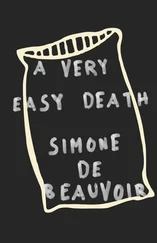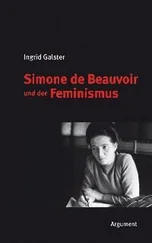Although Elisabeth had sauntered slowly along the boulevard Montparnasse, it was only twenty-five minutes past twelve when she walked into the Pôle Nord. She could never succeed in being deliberately late, and yet she felt certain that Claude would not be punctual, for Suzanne would purposely be keeping him with her, counting each minute as a tiny victory. Elisabeth lit a cigarette. She was not specially anxious for Claude to be there, but the thought that he was elsewhere was intolerable.
She felt her heart contract. Each time it was the same: when she saw him in flesh and blood in front of her, she was seized with anguish. There he was: he held Elisabeth’s happiness in the palm of his hand and he was coming towards her casually; with no suspicion that each one of his gestures was a threat.
‘I’m so glad to see you,’ said Claude. ‘At last, a real evening to ourselves!’ He smiled eagerly. ‘What are you drinking? Aquavit? I know that stuff; it’s filthy. Give me a gin fizz.’
‘You may be glad, but you stint your pleasures,’ said Elisabeth, ‘it’s one o’clock already.’
‘Seven minutes to one, darling.’
‘Seven minutes to one, if you prefer,’ she said with a slight shrug.
‘You know very well it’s not my fault,’ said Claude.
‘Of course,’ said Elisabeth.
Claude’s face darkened.
‘Please, my pet, don’t look so cross. Suzanne left me with a face like a thunder-cloud. If you start sulking too, it will be the end of everything. I was so looking forward to seeing your warm smile again.’
‘I don’t smile all the time,’ said Elisabeth, hurt. Claude’s lack of understanding was at times stupefying.
‘That’s a pity. It’s so becoming to you,’ said Claude. He lit a cigarette and looked about him benignly. ‘This place isn’t bad. It’s a bit gloomy though, don’t you think?’
‘So you said the other day. On one of the rare occasions when I do see you, I’m not anxious to have a crowd all round us.’
‘Don’t be cross,’ said Claude. He put his hand on Elisabeth’s hand, but he looked annoyed. A second later she drew her hand away. This was a bad start: an important heart-to-heart explanation ought not to begin with petty squabbling.
‘On the whole, it was a success,’ said Claude. ‘But I wasn’t really carried away for an instant. I think Labrousse doesn’t know precisely what he’s after. He’s wavering between complete stylization and pure and simple realism.’
‘It’s just that touch of stylization that he’s after,’ said Elisabeth.
‘But there isn’t any special touch about it,’ said Claude in cutting tones. ‘It’s a series of contradictions. Caesar’s assassination looked like a funereal ballet, and as for Brutus’s watch in his tent – well, it was like going back to the days of the Théátre libre.’
Claude was being too clever. Elisabeth did not let him settle questions as arbitrarily as that. She was pleased because her reply came readily to her lips.
‘That depends on the situation,’ she said quickly. ‘An assassination has got to be stylized, or else it degenerates into melodrama, and by contrast, a supernatural scene has to be played as realistically as possible. That’s only too obvious.’
‘That’s just what I’m saying. There’s no unity. Labrousse’s aesthetic is simply a kind of opportunism.’
‘Not at all,’ said Elisabeth. ‘Of course, he takes the text into account. You’re amazing; you used to accuse him of making the setting an end in itself. Do make up your mind.’
‘But it is he who can’t make up his mind,’ said Claude. ‘I’d very much like to see him carry out his famous plan of writing a play himself. Then we might know where we stand.’
‘He’ll certainly do that,’ said Elisabeth. ‘Probably next year.’
‘I’d be curious to see it. You know I have a great admiration for Labrousse, but I don’t understand him.’
‘But it’s so easy,’ said Elisabeth.
‘I’d be very grateful if you’d explain it to me,’ said Claude.
Elisabeth was silent for a while, tapping her cigarette on the table. Pierre’s aesthetic was no mystery to her. From it she took the inspiration for her painting, but words failed her. She saw once again the Tintoretto that Pierre loved so much; he had explained things to her about the attitudes of the figures, just what, she could not remember. She thought of Dürer’s woodcuts, of a marionette show, of the Russian ballet, of the old silent movies; the idea was there, familiar and obvious, and this was terribly annoying.
‘Obviously, it’s not so simple that you can pin a label on it. Realism, impressionism, naturalism, if that’s what you want,’ she said.
‘Why are you being so gratuitously unkind?’ said Claude. ‘I’m not used to technical terms.’
‘I beg your pardon, but it was you who started talking about stylization and opportunism. But don’t make excuses; your fear of being mistaken for a professor is superbly comic’
More than anything, Claude dreaded sounding in the least academic, and, in all fairness, no one could look less like a professor than he.
‘I can promise that I have nothing to fear on that count,’ he said dryly. ‘It’s you who always deliberately introduce a kind of Germanic ponderosity into our discussions.’
‘Ponderosity …’ said Elisabeth. ‘Yes, I know, every time I disagree with you, you accuse me of being pedantic. You’re amazing. You can’t bear to be contradicted. What you mean by intellectual companionship is the devout acceptance of all your opinions. Ask Suzanne for that, not me! I have the misforunte to have a brain and to presume to use it.’
‘There you go! Can’t keep your temper!’ said Claude.
Elisabeth controlled herself This was hateful; he always found a way of putting her in the wrong.
‘I may be bad tempered,’ she said with crushing calm, ‘but you can’t hear yourself talk. You sound as if you were delivering a lecture.’
‘Let’s not squabble again,’ said Claude in a conciliatory tone.
She looked at him resentfully. He had clearly made up his mind to be nice to her tonight; he felt affectionate, charming and generous, but she would show him. She coughed a little to clear her throat.
‘Frankly, Claude, have you found this month’s experiment a happy one?’ she said.
‘What experiment?’ he said.
The blood rushed to Elisabeth’s face, and her voice trembled a little.
‘If we have kept on seeing one another after our heart-to-heart a month ago, it was only by way of an experiment. Have you forgotten?’
‘Oh, of course …’ said Claude.
He had not taken seriously the idea of a complete break; she had, of course, ruined everything by sleeping with him that very night For a moment she was put out of countenance.
‘Well, I think I’ve reached the conclusion that the present situation is impossible,’ she said.
‘Impossible? Why so suddenly impossible? What’s happened now?’
‘That’s just it, nothing,’ said Elisabeth.
‘Well, then, explain your meaning. I don’t understand.’
She hesitated. Of course, he had never mentioned that he would one day leave his wife; he had never made any promises; in a sense, he was unassailable.
‘Are you really happy like this?’ said Elisabeth. ‘I put our love on a higher plane. What intimacy have we? We see one another in restaurants, in bars, and in bed. Those are just meetings. I want to share your life.’
‘Darling, you’re raving,’ said Claude. ‘No intimacy between us? Why, I haven’t a single thought that I don’t share with you. You understand me so wonderfully.’
‘Yes, I have the best part of you,’ said Elisabeth, sharply. ‘Actually, you see, we should have kept to what, two years ago, you called an ideological friendship. My mistake was to love you.’
Читать дальше












